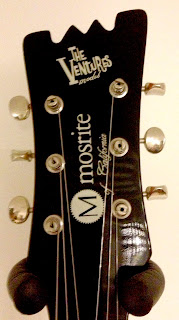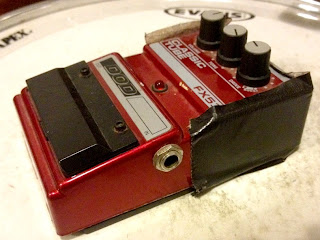I love recording. I've always paid close attention to the recording process when the bands I've played with were in a real studio - and since moving to Melbourne in 1996 I've been lucky enough to have recorded in many of Melbourne's finest. At home I've always tinkered with recording but for me it's more about delivering a finished sounding song rather than achieving a pure and technically "correct" sound.
I work with a few dudes who are mastering engineers and run a commercial recording studio owned by my employers (for whom I do graphic design). We talk about gear and recording techniques a fair bit (as well as science and skepticism) and I got some interesting reactions and comments when I played them a few tracks that I was recording for my new album "Orbital Debris".
They could hear that it probably wasn't recorded in a high-end commercial studio and that's ok with me - these guys are professionals! But then they started asking me a bunch of technical stuff that I didn't know and mentioned a bunch of gear that I'd heard of but don't know anything about. My brain goes a bit fuzzy when the technical terms come out.
I refocused my eyeballs and started to tell them how I record my songs. I think one of them actually told me to "F*ck off" in disbelief.
We've all heard some pretty bad recordings come out of "real" studios. I think I have managed to make some good/acceptable sounds in a room that I call my studio, but wouldn't be considered a studio by the recording elite.
Clutter is the key!
So if you've heard my music and think it sounds pretty good, here's why it probably shouldn't:
Stuff:
A symptom of getting old is you manage to acquire stuff. I consider myself very lucky to have a room in my house (old = mortgage & kids) that's just for me and my music. In my 36 years I've collected a few musical instruments, not many good ones, but they do the job. Many are hand-me-downs and stuff people didn't know what to do with (vintage accordion, mandolin, op shop Lincoln Chordmaster, various percussion, Stylophone, Korg Monotron, various toy pianos etc... I can't play them but I can get a sound out of them - if it makes a sound I can record it).
The important ones though are my drum kit (which I play live in my other bands), my Japanese Ventures Mosrite replica bass and my wife's 1968 Gibson SG Junior (yes, she's way cooler than me). The other guitars in the photos don't get used much and I really can't remember why I wanted a baritone guitar so badly...
Great for bleeps and space noises!
The important ones though are my drum kit (which I play live in my other bands), my Japanese Ventures Mosrite replica bass and my wife's 1968 Gibson SG Junior (yes, she's way cooler than me). The other guitars in the photos don't get used much and I really can't remember why I wanted a baritone guitar so badly...
Probably most important is my $60 pink ALDI nylon string acoustic. Not 'cos it's good, but 'cos its the one I can pick up and noodle on any time and consequently write all my songs on.
These are things I have acquired. I spent real money on a few but over the years it doesn't amount to very much. Handy when you don't make much money but have a house to pay for and a family to feed.
I love Mosrites! One day I hope to own a real one. Till then, these Japanese replicas will do - The Ventures logo is what really counts!
Microphones (more stuff):
A plank of wood makes a PZM even more awesome! Just the right height to sit on your lap and sing into!
I have never spent much time testing different mics. I've only had access to cheap and crappy ones. Luckily the ones I use most are cheap and crappy but well recognised as being great mics. Realistic PZM (pressure zone microphone) cost $60 each in the 90's from Tandy Electronics (Realistic was a brand owned and sold by Radio Shack in the USA). The one I bought 4 years ago on eBay (so I had a pair to use on drums) cost $100. Still a good price for a great mic. Real studios use them but usually only as room sound to blend with their expensive mics. They're not considered a versatile all-rounder but I use it for recording everything that requires a microphone to capture the sound - even vocals.
I borrowed 2 mics from a friend at work (a very generous and kind friend!). An Audix D4 (not super expensive but a real mic you might find in an actual studio) for kick drum and a vintage EV (Electro-Voice) mic for snare drum - this he found on the side of the road on his way to work one morning. It's rusted and dirty but it works! With these 4 mics I am getting the best drum sound I've ever had.
Glenn Campbell and Elvis have used this model mic! I hit a snare drum at it.
Guitar Amp(?):
I have one. Quite a good one. But I didn't even switch it on while I was recording "Orbital Debris". All my guitar and bass sounds are from a DOD Classic Tube pedal. This is embarrassing because even though I have a good amp, I got the sound I wanted without having to switch on a noisy amp and possibly wreck the tone by sticking the wrong microphone in the wrong place.
This is my actual guitar rig. Pedal + EQ = good enough for The Jimmy C. I am a drummer after all...
I don't think I've ever bought a pick. Being a drummer I always find myself packing up after the others have gone to the bar or are talking to girls. Being last off the stage at the end of the night, you can always find a dropped pick or two.
I use my old 4-track cassette recorder as a mixing desk. I used to record 4 tracks of drums on it then mix them onto my PC but it was noisy. In a studio you would probably use 6-10 microphones on a drum kit and record them on as many tracks. I use 4 mics and record them on to one stereo track. This means I can't make the kick louder or boost the snare or process the individual drums to sound sterile and artificial. But I don't find I need to. Stereo works for me.
All my sounds are recorded through this 4-track machine. The channels/mic pre's sound good driven hard and the EQs do what I want them to do.
What's a 70s hifi amp doing here?
I love Realistic brand hifi (I love all 70s hifi, especially if its silver!). It's not audiophile quality and the amp I use is from the 1975 but I like the sound, you can buy this stuff pretty cheap and it very often still works! After 38 years it still works!!! You can't say that about much gear from the last 20 years!
My Realistic amp is part of the signal chain. It's how I get the sound from the 4-track to the PC and back to the speakers (Realistic Optimus 5B, also from 1975). This is probably not the right way to do it. "Professionals" wouldn't do it this way 'cos it's likely "colouring" the sound somehow. But it sounds ok to me and it's the logical way to hook up the gear I have - so let's go!
Computer (more boring tech, but this is full disclosure):
My PC is old. It has a stock standard sound card with those crappy little headphone jacks in it. I still use Windows XP. It's the epitome of "nothing special". I've thought about getting a USB digital recording interface thingy that you plug mics into but seeing as it already works, why risk buying something that might not be compatible? I'm not geeky enough to know all about PCs.
The software is even older. You've heard of Pro Tools right? This isn't it. I use Cool Edit Pro 1.2, I didn't even realise I had it. A friend had given me a disc and after many years I tried it out and it worked. It's extremely primitive compared to today's standards but primitive seems to suit me. I use an even older program called Sound Forge to master and edit my mixes (though Orbital Debris had tube EQ, compression and limiting done in a professional mastering facility for free by a couple of generous and upstanding dudes). Pre 2005 software. Remember that? Compared to your smartphone it's the technological equivalent of rubbing two sticks together.
The reel to reel is another piece from my Realistic collection. It's just used as decoration for now.
So what's it all about? I've tried not to be too boring with tech details and keep it simple (failed). But this is how I do it and I think my point is: this is how ANYONE can do it. I have songs pop into my head and I play a few instruments (to some extent). I'm not unique in that respect. I don't have a disposable income but I have collected the simplest bits of gear to make my music with.
I don't consider myself overly talented but I have worked out how to make music that industry pros and "audio snobs" think sounds ok... or at least surprisingly good for the stuff I use. For me, that's a real achievement and I hope I can encourage and inspire others to give it a go! I do it this way because I can and it's within my limitations. Maybe one day I'll have the opportunity to make music with a budget and in a real studio! Till then, I'll keep making music and hope people continue to enjoy it.
Jamie Coghill aka The Jimmy C.
September 2013.
Listen to and Buy Orbital Debris here at Bandcamp.
And enjoy all of The Jimmy C's releases here at Bandcamp.




































No comments:
Post a Comment
Tell The Jimmy C what you think: